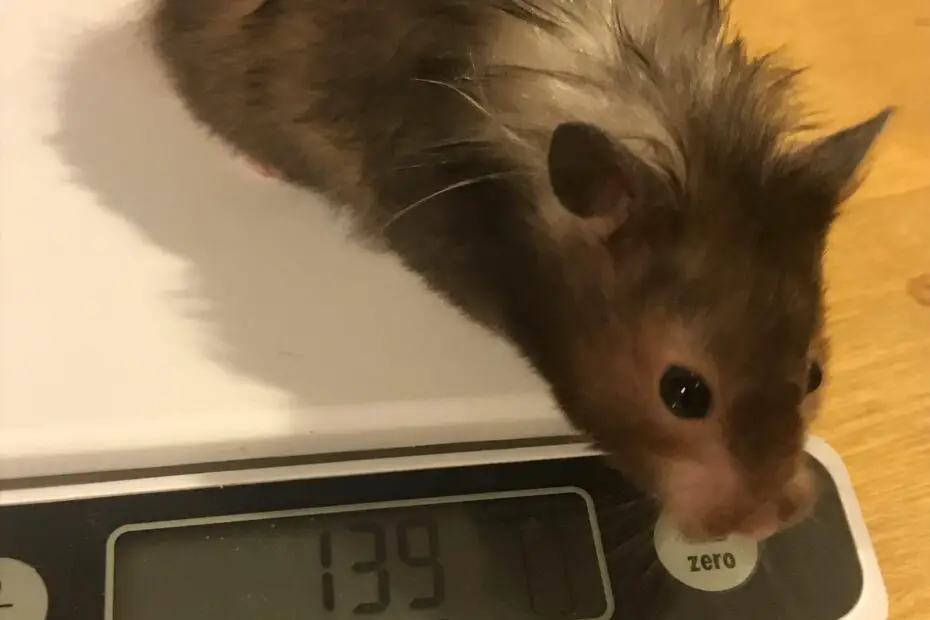Adult hamsters typically weigh between 85-150 grams, with variations depending on the species and individual size. Understanding the weight of a hamster is essential for proper care and monitoring of their health and well-being.
Hamster weight can fluctuate due to factors such as diet, exercise, and age. As a responsible pet owner, it’s important to regularly check and record your hamster’s weight to ensure they remain within a healthy range. By being mindful of their weight, you can detect any potential health issues early on and seek appropriate veterinary care if necessary.
Let’s explore the factors that influence a hamster’s weight and how to maintain their overall health. Hamsters are adorable and popular small pets that bring joy and companionship to many households. Understanding their weight and its significance is crucial for providing them with the best possible care and attention. By learning more about hamster weight, owners can ensure the well-being and longevity of their beloved furry friends.

Credit: www.hamstercentral.com
Importance Of Monitoring Hamster’s Weight
Monitoring the weight of your hamster is vital for their overall health and well-being. As a responsible pet owner, it is important to keep a close eye on the weight of your furry friend to ensure they are maintaining a healthy size. Understanding the importance of monitoring your hamster’s weight can help you identify any potential health issues and ensure they are receiving the proper nutrition.
Health Indicator
An ideal weight for a hamster typically varies based on their breed and age. However, regardless of these factors, weight can serve as an essential health indicator for your pet. Monitoring your hamster’s weight allows you to identify any sudden fluctuations, which could be a sign of underlying health problems. Obesity or excessive weight gain can lead to various health issues and decrease their lifespan.
Nutritional Concerns
Your hamster’s weight can also be an indication of their nutritional needs. Maintaining a healthy weight requires a balanced diet that meets their nutritional requirements. Regularly weighing your hamster helps you ensure they are receiving the appropriate amount of food and prevents overfeeding or underfeeding. A well-balanced diet promotes good overall health and can prevent dietary-related illnesses.
| Signs of Healthy Weight | Signs of Unhealthy Weight |
|---|---|
|
|
By monitoring your hamster’s weight, you can take appropriate action to maintain their well-being. It is important to consult with a veterinarian if you notice any significant weight changes or signs of unhealthiness. Your vet can provide valuable guidance and advice on how to manage your hamster’s weight and nutritional needs.
Factors Affecting Hamster’s Weight
Understanding the factors that affect a hamster’s weight is crucial for responsible pet ownership. From breed differences to health conditions, there are several aspects that can contribute to the weight of these small furry creatures. By being aware of these factors, you can better monitor your hamster’s well-being and address any potential issues early on.
Age
The age of a hamster can significantly impact its weight. As hamsters age, their weight may increase or decrease, depending on factors such as metabolism and activity level.
Breed
Different hamster breeds have varied body types and sizes, which can directly influence their weight. For example, Syrian hamsters are typically larger in size compared to dwarf hamsters, resulting in variations in weight among breeds.
Health Conditions
Underlying health conditions can lead to fluctuations in a hamster’s weight. Issues such as dental problems, digestive disorders, and parasites can affect a hamster’s appetite and ability to maintain a healthy weight.
How To Weigh A Hamster Correctly
When it comes to keeping your hamster healthy, it’s important to monitor their weight regularly. Knowing the correct weight of your furry friend can be essential in detecting any potential health issues. But how do you weigh a hamster correctly? Let’s explore the best practices for ensuring an accurate and stress-free weigh-in for your tiny pet.
Choosing The Right Scale
When weighing your hamster, select a small and accurate scale that can measure in grams. A digital kitchen scale is usually a suitable choice, as it can provide precise measurements for your hamster’s weight. Ensure that the scale is placed on a flat, stable surface to obtain accurate readings.
Handling Techniques
Before weighing your hamster, it’s important to handle them gently and carefully. Use both hands to lift your hamster, supporting their body and ensuring they feel secure. It’s crucial to minimize any stress or discomfort during the weighing process, as this can impact the accuracy of the measurement.

Credit: www.youtube.com
Average Weight Range For Common Hamster Breeds
When it comes to owning a hamster, many people wonder about their weight. Understanding the average weight range for common hamster breeds can provide helpful insights into the health and care of these adorable pets. In this blog post, we will explore the average weight ranges for Syrian and Dwarf hamsters.
Syrian Hamsters
Syrian hamsters, also known as Golden hamsters, are one of the most popular pet hamster breeds. They are larger in size compared to Dwarf hamsters, making them easier to handle and interact with. The average weight range for Syrian hamsters typically varies from 120 to 150 grams.
However, it’s essential to keep in mind that the weight of a Syrian hamster can vary based on various factors such as age, genetics, diet, and overall health. Some Syrian hamsters may weigh slightly more or less than the average range, and that is perfectly normal.
To ensure your Syrian hamster maintains a healthy weight, it’s important to provide a balanced diet consisting of hamster pellets, fresh fruits, and vegetables. In addition to a nutritious diet, giving them enough playing and exercise time outside their cage can help prevent excess weight gain and keep them active and fit.
Dwarf Hamsters
Dwarf hamsters, as the name suggests, are smaller in size compared to their Syrian counterparts. There are different breeds of Dwarf hamsters, including Roborovski, Campbell’s, and Winter White hamsters. The average weight range for Dwarf hamsters can vary depending on the specific breed.
| Dwarf Hamster Breed | Average Weight Range |
|---|---|
| Roborovski | 25-40 grams |
| Campbell’s | 30-50 grams |
| Winter White | 30-50 grams |
As shown in the table above, Roborovski hamsters tend to be the smallest, weighing between 25 and 40 grams. Campbell’s and Winter White hamsters fall within a similar weight range of 30 to 50 grams. It’s worth noting that individual hamsters within each breed may be slightly heavier or lighter.
Providing a balanced diet and enough space for exercise is vital for the health of your Dwarf hamster. Their smaller size means they need less food compared to Syrian hamsters, but a varied diet and enough opportunities for physical activity are essential to prevent weight gain and ensure their well-being.
Signs Of Unhealthy Weight In Hamsters
Signs of Unhealthy Weight in Hamsters:
Weight Loss
Weight loss in hamsters can indicate underlying health issues and should not be ignored.
Obesity
Obesity in hamsters can lead to various health problems, such as heart issues and joint pain.

Credit: www.reddit.com
Frequently Asked Questions For How Much Does A Hamster Weigh
How Much Does The Average Hamster Weigh?
The average hamster weight ranges from 1 to 7 ounces, depending on the species. Syrian hamsters are bigger and can weigh up to 7 ounces, while dwarf hamsters weigh around 1 to 2 ounces.
What Factors Influence A Hamster’s Weight?
Factors like diet, age, species, and overall health can impact a hamster’s weight. A balanced diet, regular exercise, and proper care contribute to maintaining an optimal weight for your pet hamster.
How Can I Ensure My Hamster Maintains A Healthy Weight?
Monitor your hamster’s food intake, provide a balanced diet rich in nutrients, offer plenty of exercise opportunities, and keep track of any fluctuations in weight. Regular veterinarian check-ups can also help identify and address any weight-related issues.
Do Hamsters Lose Weight As They Age?
Hamsters may experience weight loss as they age due to decreased metabolism and physical activity. It is essential to provide senior hamsters with a diet tailored to their changing nutritional needs and ensure they remain active for optimal health.
Conclusion
Understanding the weight of your hamster is important for its overall health and well-being. By regularly monitoring and maintaining a healthy weight for your furry friend, you can ensure they lead a happy and comfortable life. Remember to consult with your veterinarian and provide proper nutrition and exercise to keep your hamster in optimal shape.
Take small steps towards better hamster care and enjoy a wonderful companionship with your adorable pet.
- Diy Delights: Creative Ideas For Hamster Toys And Accessories - April 13, 2024
- Creating A Healthy Habitat: Essential Tips For A Happy Hamster Home - April 13, 2024
- Enrichment Galore: Boosting Your Hamster’s Happiness With Emojis - April 13, 2024


